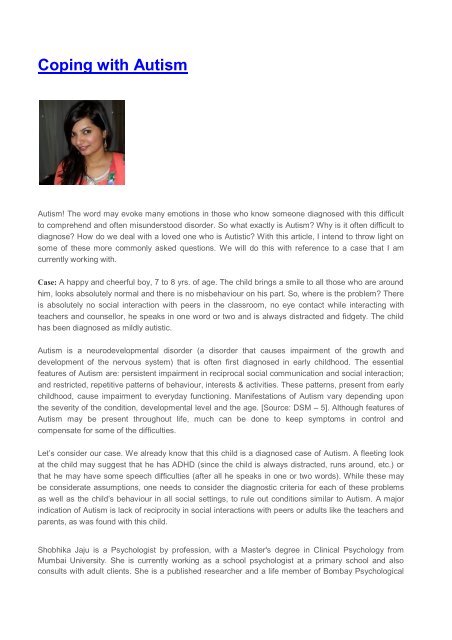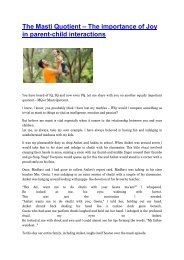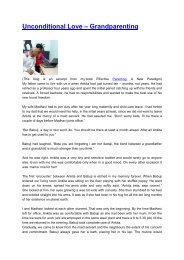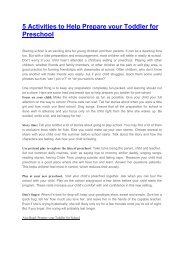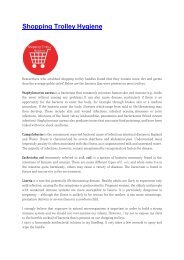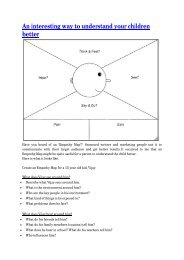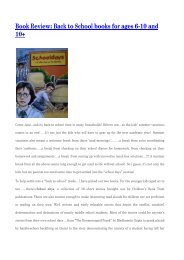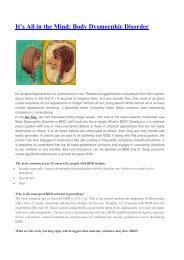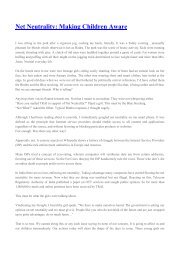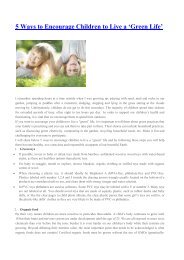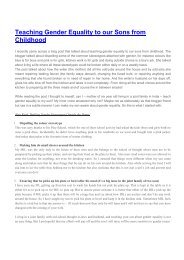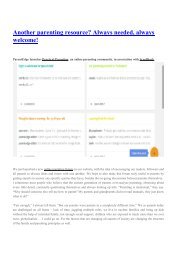Coping with Autism
Autism! The word may evoke many emotions in those who know someone diagnosed with this difficult to comprehend and often misunderstood disorder. So what exactly is Autism? Why is it often difficult to diagnose? How do we deal with a loved one who is Autistic? With this article, I intend to throw light on some of these more commonly asked questions. We will do this with reference to a case that I am currently working with.
Autism! The word may evoke many emotions in those who know someone diagnosed with this difficult to comprehend and often misunderstood disorder. So what exactly is Autism? Why is it often difficult to diagnose? How do we deal with a loved one who is Autistic? With this article, I intend to throw light on some of these more commonly asked questions. We will do this with reference to a case that I am currently working with.
Create successful ePaper yourself
Turn your PDF publications into a flip-book with our unique Google optimized e-Paper software.
<strong>Coping</strong> <strong>with</strong> <strong>Autism</strong><br />
<strong>Autism</strong>! The word may evoke many emotions in those who know someone diagnosed <strong>with</strong> this difficult<br />
to comprehend and often misunderstood disorder. So what exactly is <strong>Autism</strong>? Why is it often difficult to<br />
diagnose? How do we deal <strong>with</strong> a loved one who is Autistic? With this article, I intend to throw light on<br />
some of these more commonly asked questions. We will do this <strong>with</strong> reference to a case that I am<br />
currently working <strong>with</strong>.<br />
Case: A happy and cheerful boy, 7 to 8 yrs. of age. The child brings a smile to all those who are around<br />
him, looks absolutely normal and there is no misbehaviour on his part. So, where is the problem? There<br />
is absolutely no social interaction <strong>with</strong> peers in the classroom, no eye contact while interacting <strong>with</strong><br />
teachers and counsellor, he speaks in one word or two and is always distracted and fidgety. The child<br />
has been diagnosed as mildly autistic.<br />
<strong>Autism</strong> is a neurodevelopmental disorder (a disorder that causes impairment of the growth and<br />
development of the nervous system) that is often first diagnosed in early childhood. The essential<br />
features of <strong>Autism</strong> are: persistent impairment in reciprocal social communication and social interaction;<br />
and restricted, repetitive patterns of behaviour, interests & activities. These patterns, present from early<br />
childhood, cause impairment to everyday functioning. Manifestations of <strong>Autism</strong> vary depending upon<br />
the severity of the condition, developmental level and the age. [Source: DSM – 5]. Although features of<br />
<strong>Autism</strong> may be present throughout life, much can be done to keep symptoms in control and<br />
compensate for some of the difficulties.<br />
Let’s consider our case. We already know that this child is a diagnosed case of <strong>Autism</strong>. A fleeting look<br />
at the child may suggest that he has ADHD (since the child is always distracted, runs around, etc.) or<br />
that he may have some speech difficulties (after all he speaks in one or two words). While these may<br />
be considerate assumptions, one needs to consider the diagnostic criteria for each of these problems<br />
as well as the child’s behaviour in all social settings, to rule out conditions similar to <strong>Autism</strong>. A major<br />
indication of <strong>Autism</strong> is lack of reciprocity in social interactions <strong>with</strong> peers or adults like the teachers and<br />
parents, as was found <strong>with</strong> this child.<br />
Shobhika Jaju is a Psychologist by profession, <strong>with</strong> a Master's degree in Clinical Psychology from<br />
Mumbai University. She is currently working as a school psychologist at a primary school and also<br />
consults <strong>with</strong> adult clients. She is a published researcher and a life member of Bombay Psychological
Association. Shobhika also guest lectures and works as a workshop facilitator for schools, colleges and<br />
corporate institutes. She is currently writing for Evescape and Planet-Goa. She has her own<br />
blog http://shobhika.blogspot.in Also see more info @ http://www.parentedge.in


